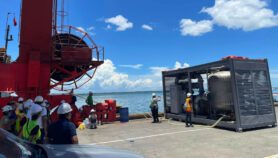By: Wagdy Sawahel
Send to a friend
The details you provide on this page will not be used to send unsolicited email, and will not be sold to a 3rd party. See privacy policy.
Saudi Arabia will launch several new centres to boost nanotechnology research in the region.
The Saudi Arabian national research and development organisation and international research organisation IBM Research announced an agreement last week (26 February) to establish the Nanotechnology Centre of Excellence at the King Abdulaziz City for Science and Technology in the capital, Riyadh.
The centre will collaborate with IBM Research to identify and develop promising opportunities in nanotechnology. It will research materials for solar energy and nanomembranes for the desalination of seawater. Researchers will also investigate new methods for recycling plastic materials.
King Abdullah of Saudi Arabia has also donated US$9.6 million to establish further nanotechnology institutes at universities around the country, to promote education and research in nanotechnology.
The US$3.2 million King Abdullah Institute for Nanotechnology will open by mid-2008 at the King Saud University in Riyadh, according to the Arab News website.
Theodor Hänsch of the Max Planck Institute in Munich, Germany — winner of the 2005 Nobel Prize in physics — will teach as a visiting professor at the institute, as part of the university’s Nobel laureates programme (see Nobel laureates to strengthen Saudi science).
Two other nanotechnology institutes are also planned, for King Abdul Aziz University in Jeddah and the King Fahd University for Petroleum and Minerals in Riyadh, at a cost of US$3.2 million each.
Mohammed Kuchari, associate professor at King Abdul Aziz University told SciDev.Net, "These nanotechnology initiatives along with King Abdullah University of Science and Technology, due to open in 2009, will provide good tools for implementing [Saudi Arabia’s] 25-year plan for higher education."
Kuchari says nanotechnology, information technology and biotechnology are central elements in the plan, which is expected to be announced later this year.
Abdel Wahab Rajab Hashem, a professor at King Saud University, says the centres will provide the human resources, innovation and pioneering technology needed to implement the Gulf strategy being prepared by the six members of the Gulf Cooperation Council, including Saudi Arabia, to transform their industries from petroleum production to knowledge-based industries using nanotechnology and biotechnology.













